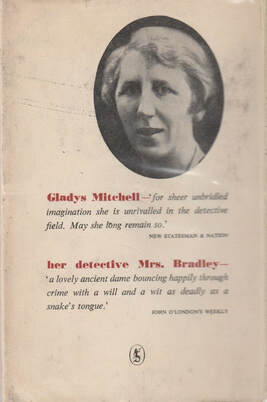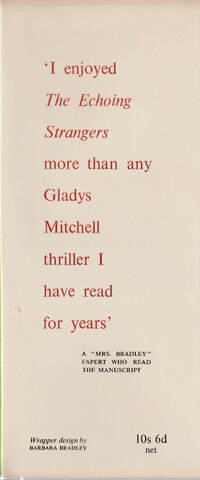
This time around, we have some reading group veterans as well as a new voice, and I welcome you all! Joyka and Chris join us once more, as does mystery fiction author Catherine Dilts. As well as penning multiple book series, Catherine’s new short story “Claire’s Cabin” appears in the current issue of Alfred Hitchcock’s Mystery Magazine (March/April 2023). We also have busy crime fiction bloggers José and Tracy K. on board. You can visit Tracy’s great site at Bitter Tea and Mystery while José oversees A Crime Is Afoot, his excellent blog offering visitors an in-depth, self-described “random walk through classic crime fiction”. And a hearty welcome to Theda, who joins the reading group for the first time; we are so happy to have you with us!
This time I will structure the observations as a sort of group discussion roundtable, moving from the comments of one contributor to another without building them into narrational paragraphs. This saves me some energy (which is in depressingly low supply these days) and I think it will move the conversation along a bit more fleetly. We begin, aptly, at
THE BEGINNING
José – The Echoing Strangers, a mystery detective novel by British writer Gladys Mitchell, is the 25th entry in her long-running series featuring psychoanalyst and amateur detective Mrs Bradley. The story was first published in Great Britain by Michael Joseph Ltd. London in 1952, and it has been reprinted several times, the latest in 2014 by Vintage Press, an imprint of Penguin Random House.
Catherine – Mrs Bradley still endures Gladys Mitchell's harsh physical descriptions, but seems more human than in earlier novels. She has a reputation for solving mysteries. Mrs. Bradley sniffs out an intriguing one when she witnesses a youth pushing a middle-aged woman into the river. Her chauffeur fishes a soaked Miss Higgs from the water. She is apologetic for the boy Francis, who is deaf, dumb, and beautiful. Mrs Bradley settles into the village of Wetwode and is soon directed to a body when Francis sculpts a macabre scene in plasticine.
Joyka – This is my favorite type of Mrs Bradley book: she is the psychiatrist. I get so immersed in her “sessions” that I forget she is totally fictitious. Her work getting Francis Caux to open up was first class.
Tracy K. – Mrs Bradley discovers very quickly that the boy is the grandson of Sir Adrian Caux, and has been living with Miss Higgs for several years. He is deaf and dumb, and has a twin brother.
THE TWINS

Francis: large eyes, a saintly expression but focus is on the fact that he is troubled, traumatized, and unable to communicate, but is teachable in other things (ex: chess).
Derek: exquisitely beautiful, but girlish traits emphasized in descriptions: “hand as slender as a girl’s”, “shrieking in a high girlish voice, near to tears”. To Tom, he is most often repugnant, in how he sings, in how he and his grandfather Sir Adrian interact, in how much his eating habits are commented upon. Even his own words disparage him: “I’m sure I shall find myself telling them things, true and untrue, if they begin to question me”.
Catherine – The attitudes toward differently-abled people is true to the 1952 era. Francis' issues were caused by the shock of seeing his parents die. There is sympathy for him, but people treat him as defective.
José – The twins’ parents died in a car accident. Francis, we are told, was in the car with them and managed to get out unscathed, but the shock left him deaf and dumb. His grandfather got rid of him while taking the other son, Derek, into his care, making him his sole heir.
Catherine – Tutor Tom Donagh finds the doting grandfather's relationship with his grandson Derek peculiar. Tom catches Sir Adrian cheating during games. The man takes cricket way too seriously. And then a player on an opposing team is murdered.
TWINNING IN THEME AND STRUCTURE
Tracy K. – In this section of the book, the chapters alternate between Mrs Bradley and her investigations, and Tom Donagh and his time spent with Sir Adrian and Derek. I like that style of storytelling; it builds suspense and keeps me interested in the story.
Chris – From the distinct settings of the opening two chapters, we learn that Gladys Mitchell has set herself the challenge of constructing a mystery with two contrasting locations, one familiar - the New Forest in Hampshire - the other a ‘holiday-adventure’ scene, the Norfolk Broads being a wetland of linked rivers and lakes enjoyed by boating enthusiasts. As becomes clearer in these first six chapters, the locations are contrasted thematically as dry versus wet, on the basis of their summer sports activities: cricket cannot seriously be played in the rain - although Sir Adrian tries his worst - any more than swimming and boating can be conducted on dry land.
The contrast appears also in the dramatis personae: Mede is a traditional village hierarchy dominated by the lord of the manor, who has both the local clergyman and the pub landlord in his pocket along with all the servants, while Wetwode is a more accidental association of weekenders and summer tenants, among whom identities and social relations are opaque. The connections made between these settings rely in part on unlikely coincidences, and in part on the use of a highly traditional device of European comedy (Plautus via Shakespeare), the separated-twins plot. The locations themselves are separate and yet ‘twinned’.
This split-location structure invites us to assign special importance to any discerned links between them, whether overt, as with the reuniting of the Caux twins in Chapter 6 (effectively the dramatic ‘curtain’ to Act 1) or half-concealed, as with certain clues to the two murders: when we learn that the murdered cricketer Witt originally came from East Anglia, and that the mystery man who commissioned the iron hoops for Campbell’s corpse from the Wetwode blacksmith spoke with a West-Country accent, we suspect that the two sites may be twinned in ways that are yet to be disclosed.
CRICKET, WIT, AND WITT
Tracy K. - The fourth chapter is entirely about cricket, and the games that the local teams are playing, with lots of details which went way over my head. In this plot thread, one of the cricket players is murdered. Are the two murders connected?
José – What follows might be a bit difficult to understand for those who, like me, are not familiar with the game of cricket. Anyway, suffice it to say that when the day of the game between Mede and Bruke comes, the game has an unexpected end when Witt, Bruke’s captain, is found dead in the dressing rooms. According to Sir Adrian, Witt was known to have one great enemy, Peter Cornish. There was bad blood between them for years. It began during the war, though nobody ever quite knew what was all about.
Theda – Cricket: I have even read a book on this sport and still don’t fully understand it. I wonder, however, if the game is simply to provide tone, location, or possible motives for the murder. It’s also a good look into Sir Adrian’s character, which may prove important not only to the murder but to how the twins move forward. Still, I wonder if how the game is played, its rules, will somehow be important to the plot later on – because there is a great deal of detail about the actual game play.
Chris – The story can be understood and enjoyed without detailed knowledge of cricket, although it helps to know that the basic principles are akin to baseball. Bowling in cricket, though, differs from baseball pitching in that the bowler usually aims to make the ball bounce up to the batsman unpredictably from the grass surface in front of him. Hence the significance of the ‘bowler’s wicket’ (the title of Chapter 4), otherwise known as a ‘sticky wicket’, meaning a grass playing surface that is treacherous for batsmen on account of its unevenness or dampness.
More important here than these technical features of the game are its social and ethical contexts. We are told in this chapter that the ethic of English cricket is Decency, although Sir Adrian’s many ways of cheating and fixing clearly prompt us to question this claim.
Also significant is the ironic title of Chapter 2, ‘Amateur Status’, which more directly concerns the social prestige of Sir Adrian’s (and Tom Donagh’s) class. In the 1950s a clear distinction was observed in cricket between Players, who were working-class men paid to take part, and Gentlemen, whose participation was strictly amateur and thus untainted by money. It’s worth noting that although Tom Donagh idly boasts at first that ‘I wouldn’t mind being paid for a week’s cricket’, in the event he scrupulously declines any payment for playing (while accepting the tutor’s fee), thereby salvaging his status as a Gentleman.
Joyka – The “cricket house” is certainly odd. I have never understood cricket. By the time I finished Chapter 4, I realized I will not get an understanding of cricket from this book. I definitely am getting a good understanding of Adrian Caux.
Chris – What I usually enjoy most about Gladys Mitchell’s novels is her creation of lavishly eccentric characters, and I’m reminded here of Mrs Puddequet in The Longer Bodies, who also asserts her power and wealth by setting up an unlikely sporting contest. Sir Adrian, along with his dubiously hired domestic entourage, is a particularly vivid example of the type, combining obsessive mania with satirically exaggerated social stereotype.
REFLECTING AND LOOKING FORWARD

Catherine – Chapter Six ends with the climactic moment Mrs. Bradley reunites the twins by bringing Francis to Sir Adrian's home.
José – To everyone surprise, Francis begins to speak: “You are Derry. I am glad to see you. I am Francis. We are twins. There was a dead man underneath the boat. I do not like dead men. Do you like dead men?”
Theda – I’m eagerly awaiting the interactions between the twins now that they are together (and Francis is speaking! Albeit as a 7-year-old would).
Tracy K. – I am very enthusiastic about this story so far. It is unlike any Gladys Mitchell book I have read, but I have only read four so far. It has been a fun read to this point and I laughed out loud at some of Mrs. Bradley's behavior.
Joyka – I think I should keep a list of my favorite GM expressions. In this story, we are told that Mrs Bradley could “charm the jewel out of a toad’s head!”
And that concludes the comments on the first six chapters of The Echoing Strangers. Thank you everyone for contributing! Join us next week as plots thicken and discussion continues.
 RSS Feed
RSS Feed